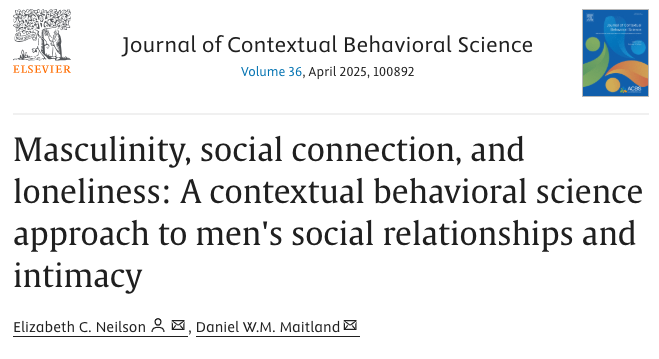Journal of Contextual Behavioral Science (JCBS)
Volume 36, April 2025
Authors
Elizabeth C. Neilson, Daniel W.M. Maitland
Key Findings
- Many men report loneliness and a desire for more intimacy in relationships.
- Behavior consistent with inflexible masculinity may disrupt men's relationships.
- Men develop rules for how to behave in relationships based on past experiences.
- Research is needed on men's responses to vulnerability and view of others' responses. • A contextual behavior science understanding of men's behavior in relationships can help clinical work.
Abstract
Loneliness—the discrepancy between actual and desired levels of social connection—is a pervasive public health concern. Research suggests that many men report loneliness and desire more intimate relationships. The Interpersonal Process Model of Intimacy posits that intimacy, the meaningful connection between two individuals, is a critical variable in preventing loneliness and develops through a bidirectional process of vulnerable self-disclosure, responsiveness, and perceived partner responsiveness. This manuscript applies the Interpersonal Process Model of Intimacy, as interpreted from a contextual behavior science lens, to contextualize the existing research on masculinity and men's social relationships to inform future research and clinical practice. We review the research on men's engagement in different components of the model (vulnerable self-disclosure, responsiveness, perceived partner responsiveness), emphasizing how masculinity informs men's behavior. Research indicates that men often do not engage in behaviors essential to a contextual behavioral model of intimacy (e.g., vulnerable emotions, distress, or asking for help) because such behaviors are inconsistent with masculinity. Research also indicates men often do not acknowledge others' disclosures or respond with judgment or confusion. Men may also perceive responsiveness as stressful due to social proscriptions regarding receiving help. We discuss implications for research and clinical interventions to ameliorate men's loneliness.
